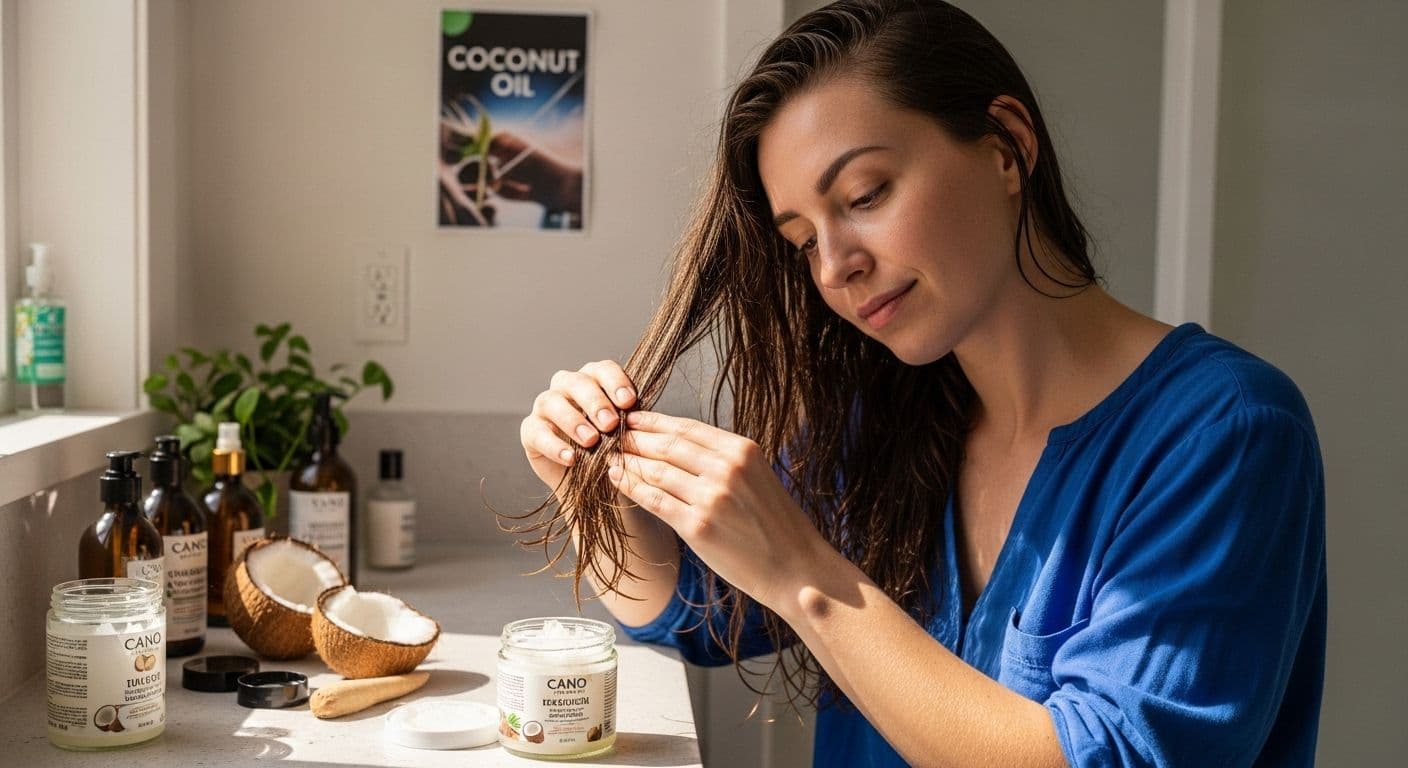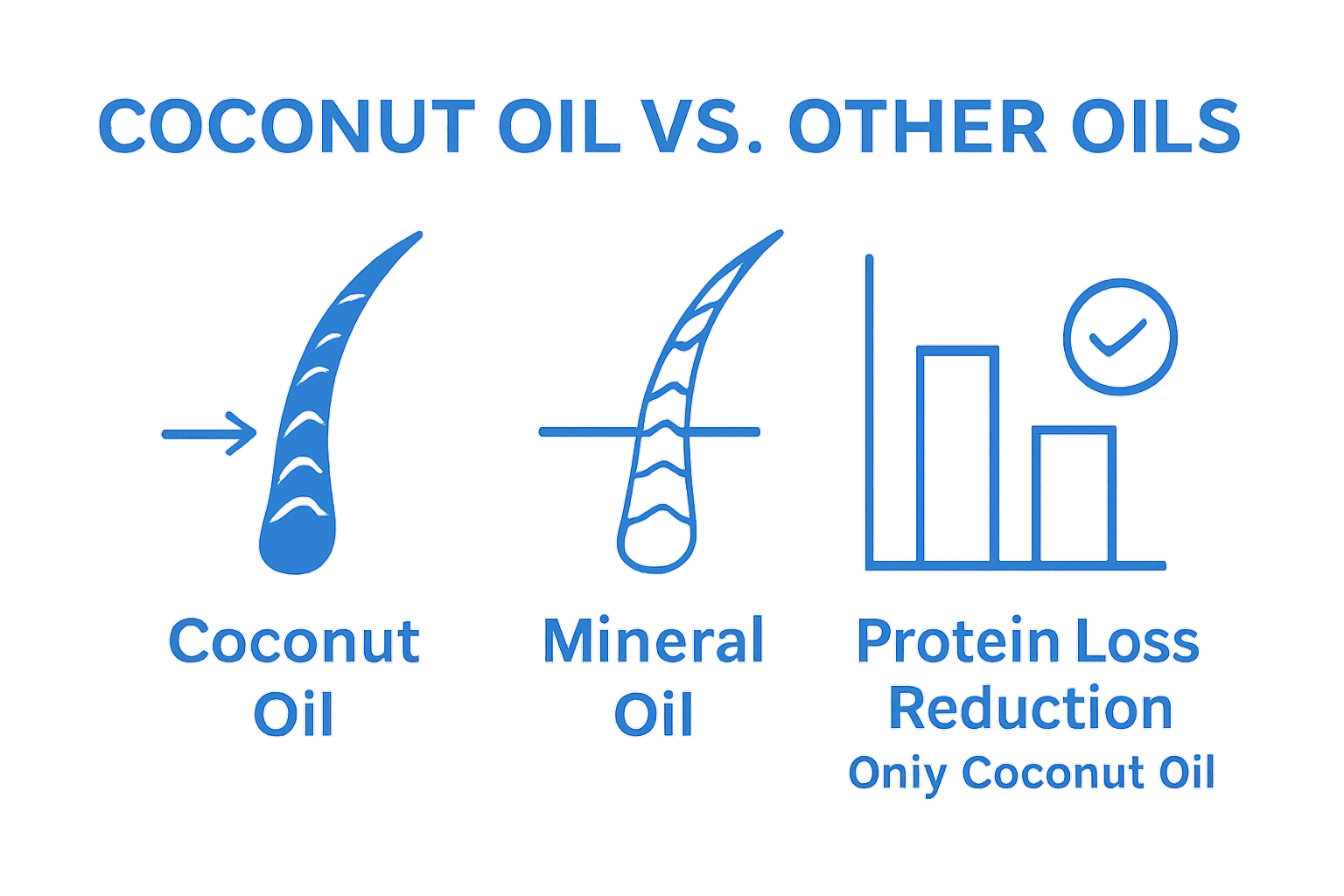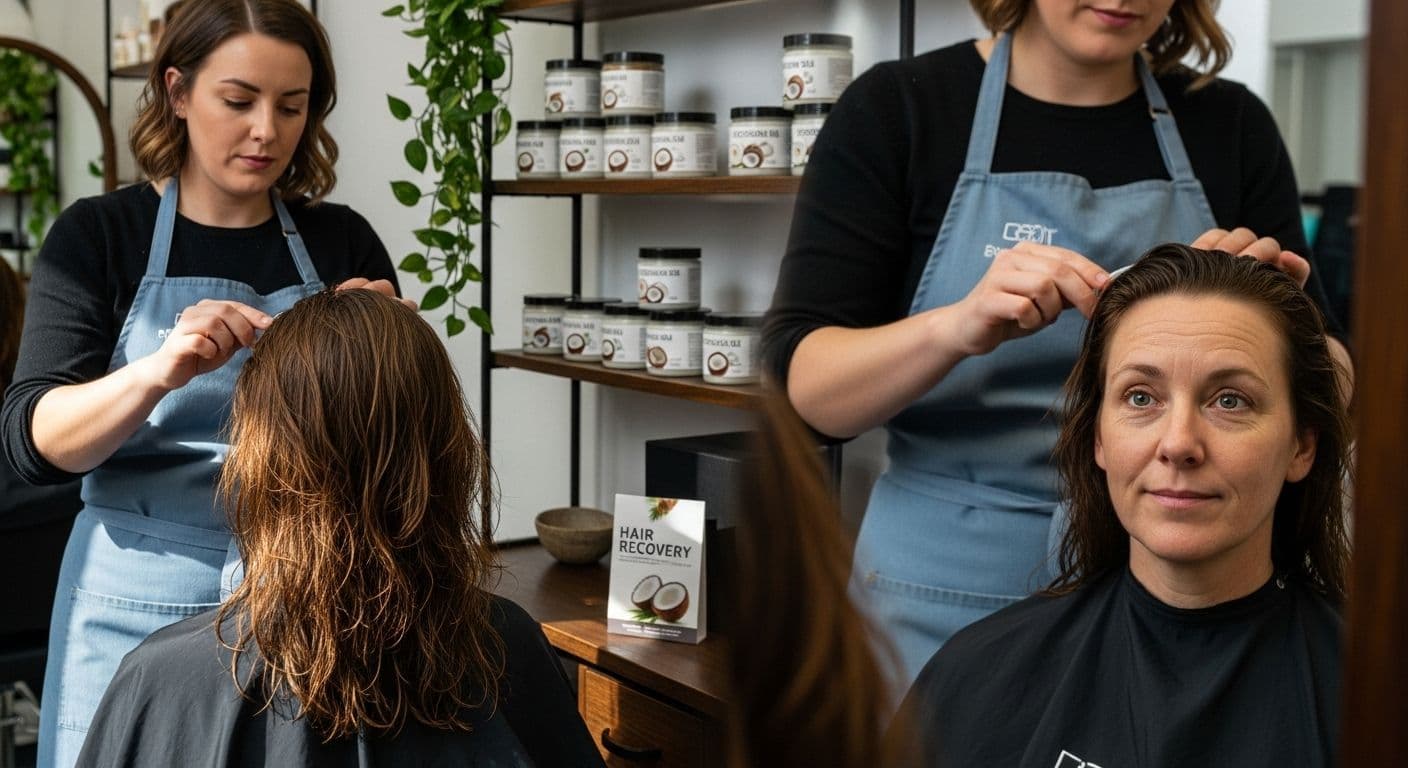Blog
Learning Materials
Understanding Coconut Oil for Damaged Hair: A Deep Dive
Updated: August 31, 2025

Coconut oil is everywhere, from kitchen shelves to beauty tutorials, and it is praised as a natural fix for damaged hair. But when you look at what it actually does, the science might surprise you. Research shows coconut oil can reduce protein loss in hair by up to 39 percent compared to mineral oil and sunflower oil. This means its true strength is not just in everyday shine, but in real molecular repair most store-bought products cannot match.
Table of Contents
- What Is Coconut Oil And Why Is It Used For Hair?
- The Importance Of Moisture And Nourishment In Hair Care
- How Coconut Oil Works To Repair Damaged Hair
- Key Nutrients In Coconut Oil That Benefit Hair Health
- Real-World Applications Of Coconut Oil For Hair Recovery
Quick Summary
| Takeaway | Explanation |
|---|---|
| Coconut oil reduces hair protein loss. | Coconut oil’s unique structure minimizes protein damage, enhancing hair strength and resilience. |
| Coconut oil improves hair’s moisture retention. | It helps maintain optimal hydration, preventing breakage and preserving shine. |
| Apply coconut oil for chemical damage recovery. | Coconut oil effectively restores the protein structure of hair affected by chemical treatments and heat styling. |
| Coconut oil protects against environmental damage. | Creates a barrier against UV rays and pollution while maintaining moisture levels in hair. |
| Essential nutrients in coconut oil support hair health. | Coconut oil contains fatty acids and vitamins that nourish hair, promoting overall strength and growth. |
What is Coconut Oil and Why is it Used for Hair?
Coconut oil is a versatile natural extract derived from mature coconut kernels, renowned for its potential transformative effects on hair health. This nutrient-rich oil contains a unique combination of fatty acids, vitamins, and minerals that make it particularly beneficial for addressing damaged hair concerns.
The Composition of Coconut Oil
At its core, coconut oil is composed primarily of medium-chain triglycerides (MCTs), with lauric acid being the most prominent component. According to research published in the Journal of Drugs in Dermatology, these molecular structures enable unique hair penetration capabilities that distinguish coconut oil from other hair treatments.
Key characteristics of coconut oil include:
- High concentration of saturated fatty acids
- Natural antimicrobial properties
- Ability to penetrate the hair shaft deeply
- Rich in vitamins E and K
Why Coconut Oil Works for Hair Restoration
The molecular structure of coconut oil allows it to interact differently with hair proteins compared to other oils. Scientific investigation reveals that coconut oil can actually reduce protein loss, which is critical for hair strength and resilience. Our comprehensive hair analysis guide provides deeper insights into how this natural remedy supports hair health.
When applied correctly, coconut oil can address multiple hair challenges by:
- Reducing protein loss in damaged hair
- Protecting hair from environmental damage
- Improving hair shaft strength
- Providing natural conditioning
The unique molecular structure allows coconut oil to penetrate the hair cuticle more effectively than many synthetic treatments, making it a powerful natural solution for individuals struggling with hair damage and breakage.
The Importance of Moisture and Nourishment in Hair Care
Moisture and nourishment are fundamental pillars of healthy hair, acting as critical components in maintaining hair strength, elasticity, and overall appearance. Understanding how these elements interact can transform your approach to hair care and help prevent long-term damage.
Understanding Hair Moisture Dynamics
Hair is a complex protein structure that requires consistent hydration to maintain its integrity. When hair becomes dry, it becomes brittle, prone to breakage, and loses its natural shine. Our comprehensive guide on natural hair remedies explores the intricate balance of maintaining optimal hair moisture.
Key aspects of hair moisture include:
- Preventing protein structure breakdown
- Maintaining hair elasticity
- Protecting against environmental damage
- Reducing friction and potential hair breakage
Nutritional Requirements for Hair Health
Proper nourishment goes beyond surface-level treatments. According to research published in scientific journals, hair requires a complex mix of nutrients to maintain its structural integrity. The penetrative capabilities of natural oils like coconut oil can help deliver essential vitamins and minerals directly to the hair shaft.
Critical nutritional components for hair include:
- Proteins for structural strength
- Fatty acids for moisture retention
- Vitamins E and K for follicle health
- Minerals that support hair growth and resilience
By understanding and implementing a holistic approach to hair moisture and nutrition, individuals can significantly improve their hair's health, appearance, and longevity. The key lies in consistent care, using targeted treatments that address both external hydration and internal nutritional support.
How Coconut Oil Works to Repair Damaged Hair
Coconut oil operates as a sophisticated molecular treatment for damaged hair, leveraging its unique chemical composition to restore and protect hair fibers from within. Understanding its mechanism of action reveals why this natural remedy has become a powerful solution for hair restoration.
Molecular Penetration and Protein Protection
The extraordinary ability of coconut oil to repair hair stems from its molecular structure. According to research published in the Journal of Cosmetic Science, coconut oil can penetrate the hair shaft due to its low molecular weight and linear chain configuration. This deep penetration allows it to interact directly with hair proteins, reducing structural damage.
Key mechanisms of coconut oil's protective action include:

- Blocking protein loss through molecular bonding
- Reducing structural stress on hair fibers
- Creating a protective barrier against environmental damage
- Minimizing protein degradation
Addressing Structural Hair Damage
Our guide on natural hair repair techniques highlights how coconut oil addresses multiple dimensions of hair damage. Its unique fatty acid composition enables it to reconstruct and reinforce weakened hair protein structures, effectively combating the cumulative effects of chemical treatments, heat styling, and environmental stressors.
Critical repair mechanisms include:
- Rebuilding damaged protein networks
- Restoring hair shaft flexibility
- Preventing cuticle layer deterioration
- Enhancing overall hair resilience
By targeting hair damage at the molecular level, coconut oil provides a comprehensive approach to hair restoration that goes beyond surface-level conditioning. Its ability to penetrate, protect, and reconstruct makes it a powerful natural solution for individuals struggling with compromised hair health.
Key Nutrients in Coconut Oil that Benefit Hair Health
Coconut oil is a powerhouse of essential nutrients that work synergistically to restore and maintain hair health. Understanding the specific components responsible for its remarkable hair care properties can help individuals make informed decisions about incorporating this natural remedy into their hair care routine.
Fatty Acids: The Structural Backbone
The cornerstone of coconut oil's effectiveness lies in its unique fatty acid profile. According to research published in nutrition science journals, medium-chain fatty acids particularly lauric acid are the primary agents responsible for hair repair and protection. These fatty acids possess an extraordinary ability to penetrate the hair shaft and interact directly with hair proteins.
Key fatty acids and their functions include:
- Lauric acid for deep hair shaft penetration
- Capric acid supporting hair protein structure
- Reducing protein loss and preventing hair damage
- Creating a protective molecular barrier
Vitamins and Antioxidants: Cellular Protection
Our comprehensive guide on hair growth strategies explores how vitamins in coconut oil contribute to overall hair health. The oil contains critical antioxidants and vitamins that combat oxidative stress and support hair follicle resilience.
Essential nutrients found in coconut oil include:
- Vitamin E for cellular protection
- Polyphenols preventing oxidative damage
- Tocopherols supporting hair strength
- Trace minerals enhancing hair growth potential
By delivering a complex array of nutrients directly to hair follicles and shaft, coconut oil provides a holistic approach to hair restoration.
Here is a table highlighting the key components found in coconut oil and their specific roles in promoting hair health.
| Component | Function for Hair |
|---|---|
| Lauric Acid | Deep shaft penetration; reduces protein loss |
| Capric Acid | Supports hair protein structure |
| Saturated Fatty Acids | Moisture retention; creates protective barrier |
| Vitamin E | Provides cellular protection for hair |
| Vitamin K | Supports overall follicle health |
| Polyphenols | Prevents oxidative damage; antioxidant properties |
| Trace Minerals | Enhances strength and growth potential |
Real-World Applications of Coconut Oil for Hair Recovery
Coconut oil transcends theoretical potential, offering practical solutions for individuals struggling with various hair damage scenarios. Its versatility makes it a powerful tool for addressing multiple hair health challenges, from chemical treatment recovery to environmental stress mitigation.
Treating Chemical and Heat Damage
Professional hair stylists and researchers recognize coconut oil as a critical intervention for hair damaged by chemical treatments and heat styling. According to research published in the Journal of Cosmetic Science, coconut oil can significantly reduce protein loss in both chemically treated and heat-damaged hair strands.
Key recovery applications include:
- Restoring protein structure after bleaching
- Rebuilding hair integrity post-chemical treatment
- Reducing breakage from repeated heat styling
- Preventing further structural deterioration
Environmental Stress and Hair Resilience
Our specialized guide on hair protection techniques explores how coconut oil creates a protective barrier against environmental challenges. Its molecular structure allows it to shield hair from UV radiation, pollution, and humidity, which can cause progressive damage and weakening.
Significant environmental protection strategies involve:
- Creating a natural UV protective layer
- Blocking pollution particle absorption
- Maintaining hair moisture in extreme climates
- Preventing oxidative stress from environmental factors
By understanding and implementing targeted coconut oil applications, individuals can transform their hair recovery process. Its comprehensive approach addresses damage at molecular and structural levels, offering a holistic solution for comprehensive hair restoration.
This table compares how coconut oil addresses various types of hair damage and highlights what sets it apart from other oils and treatments, based on information found in the article.
| Type of Damage | How Coconut Oil Helps | What Makes It Effective |
|---|---|---|
| Chemical (bleaching/dyeing) | Restores protein structure, reduces breakage | Deep penetration, protein bonding |
| Heat Styling | Rebuilds hair integrity, minimizes protein loss | Low molecular weight for shaft access |
| Environmental (UV, pollution) | Protects with natural barrier, maintains moisture | Rich in antioxidants, creates shield |
| General Brittleness/Dryness | Improves moisture retention, restores shine | Fatty acids for hydration, supports elasticity |

Personalize Your Damaged Hair Recovery with AI-Powered Insight
Struggling with persistent hair breakage and dryness despite using natural solutions like coconut oil? If you want real answers for rebuilding hair strength and restoring moisture, you need a plan that is designed just for you. Imagine harnessing the science behind coconut oil and combining it with the power of advanced AI to finally address loss, dryness, and lack of resilience at the root level.

Take control today and uncover what your hair truly needs. Upload your hair scan to MyHair.ai and receive a full AI-based hair health analysis. Get precise growth projections, track changes over time, and discover personalized product recommendations built on proven scientific research like what you explored in this article. Stop guessing and start seeing real results now—your hair's transformation starts with insight tailored to you.
Frequently Asked Questions
What are the benefits of using coconut oil for damaged hair?
Coconut oil provides multiple benefits for damaged hair, including reducing protein loss, deeply conditioning hair, protecting against environmental damage, and enhancing overall hair strength and resilience.
How does coconut oil penetrate the hair shaft?
Coconut oil's molecular structure, particularly its medium-chain triglycerides, allows it to penetrate the hair shaft more effectively than many other oils, enabling it to interact directly with hair proteins and reduce structural damage.
Can coconut oil help restore hair damaged by chemical treatments?
Yes, coconut oil can significantly aid in restoring hair that has been damaged by chemical treatments. It helps to rebuild protein structure and reduce breakage by providing necessary moisture and protection.
How should I apply coconut oil to my hair for the best results?
For optimal results, apply coconut oil to dry or damp hair. Focus on the ends and work your way up, allowing the oil to soak in. Consider leaving it in for several hours or overnight before washing out with a gentle shampoo.